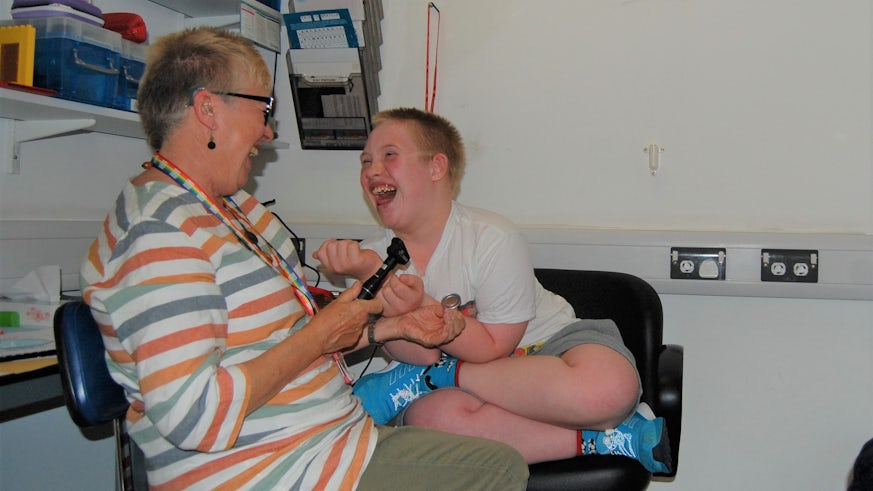‘My dream is that no-one with Down’s syndrome should have to travel to find specialist eye care’
22 June 2021

As the first eye clinic for people with Down’s syndrome is launched in England, the woman who inspired the new facility through her pioneering work in Cardiff speaks about what it means.
The first specialist eye clinic in England for people with Down’s syndrome has been launched to help children who struggle with traditional eye tests.
The University of Portsmouth has set up the service, which provides specialist equipment and staff trained to meet the needs of people with the condition.
The facility was inspired by a clinic operated by Dr Margaret Woodhouse, head of the Down’s Syndrome Vision Research Unit at Cardiff University.
Dr Woodhouse has developed tests to assess vision and is interested in how visual impairment affects education and daily living skills, leading the way in research and treatment of vision problems in children with Down’s syndrome. In 2017, the Unit won the UK’s most prestigious academic award – a Queen’s Anniversary Prize – for its pioneering work and the team continue to research and grow the service.

Here, Dr Woodhouse speaks about her journey – and explains what it means to see other clinics following suit:
“Our clinic started out as a paediatric clinic in the late 1980s. From the very start, children with learning disabilities attended, so it was a steep learning curve for me and my colleagues since we had no prior experience of alternative techniques for eye examinations. We had to develop our own techniques, and this fed into our research. So, the Cardiff Acuity Test, which is a commercially available test (and has several spin-offs) arose from the need to measure vision in children who could not name pictures, for example. The main focus of my research has been visual problems in children with Down's syndrome, which arose from our observations in the clinic, particularly that many children struggled to focus on near tasks.
“The clinic grew simply by word of mouth. Many children and adults with special needs find visits to hospital eye clinics distressing and even frightening, so parents of little ones who could not cooperate within a hospital setting brought the children to us, and then spread the word. We are a clinic for patients of all ages with all forms of disabilities, but because of my research, I tend to see mostly children with Down's syndrome. But anyone is welcome.
“What we have achieved is a service for – not just the local community – but the UK community; many of our patients travel very long distances. We are also obviously, a teaching resource, so that our undergraduate students learn the basic skills needed to see patients with special needs, including ways of communicating with non-verbal patients. We are unique in England and Wales in providing didactic teaching and practical experience of special needs optometry at both undergraduate and postgraduate levels.
“We also offer experience to any professionals with an interest; out of term-time, I am often joined in my clinic by specialist teachers, paediatricians, social workers, rehabilitation officers, therapists and so on who want to learn more about eye care. Not forgetting of course, that there are now hundreds of children and adults with special needs who are seeing clearly or whose visual problems are being managed appropriately, because of the eye examinations that we have provided.
“I believe our clinic has had a wider influence in optometry, not only in sending out our students equipped with the awareness of and interest in this field, but by raising awareness in the profession as a whole and encouraging optometrists in practice to develop skills in this area. There are now optometric practices throughout the UK where children and adults with special needs can get good eye care and I take a little bit of credit for that. Through the research, we have made a substantial difference to the education of children with Down's syndrome, by providing spectacles and by alerting parents and teachers to the visual issues that the children experience.
“The pandemic has been difficult. We had to cancel appointments for more than 300 patients in the first lockdown. A lot of children have missed out on their annual eye exam and are now booked in after a two-year (rather than their usual one-year) wait.
“My dream is for every UK area to have at least one optometric practice within easy reach of families, so no-one will have to travel to Cardiff for specialist eye care. I see patients who came to me as tiny babies and are now adults – and I am very fond of all of my patients. I would miss them if they found eye care locally, but I know it is best for them. I am very excited about the new clinic in Portsmouth, and proud to be associated with it. I hope that, in turn, other facilities will follow suit.”
